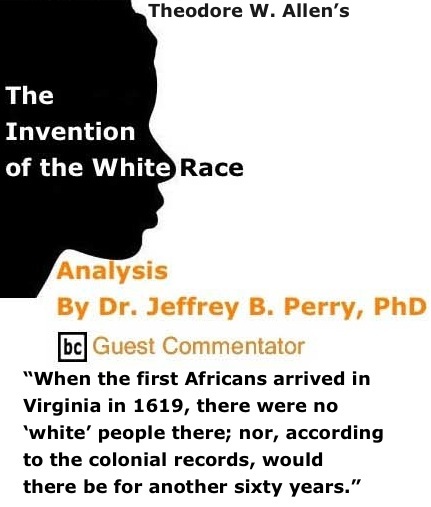

Allen’s original 700-pages magnum opus, already recognized as a “classic” by scholars such as Audrey Smedley, Wilson J. Moses, Nell Painter, and Gerald Horne, included extensive notes and appendices based on his twenty-plus years of primary source research. The November 2012 Verso edition adds new front and back matter, expanded indexes, and internal study guides for use by individuals, classes, and study groups. Invention is a major contribution to our historical understanding, it is meant to stand the test of time, and it can be expected to grow in importance in the 21st century.
“When the first Africans arrived in Virginia in 1619, there were no ‘white’ people there; nor, according to the colonial records, would there be for another sixty years.”
That arresting statement, printed on the back cover of the first (1994) volume, reflected the fact that, after pouring through 885 county-years of Virginia’s colonial records, Allen found “no instance of the official use of the word ‘white’ as a token of social status” prior to its appearance in a 1691 law. As he explained, “Others living in the colony at that time were English; they had been English when they left England, and naturally they and their Virginia-born children were English, they were not ‘white.’” “White identity had to be carefully taught, and it would be only after the passage of some six crucial decades” that the word “would appear as a synonym for European-American.”
Allen was not merely speaking of word usage, however. His probing research led him to conclude – based on the commonality of experience and demonstrated solidarity between African-American and European-American laboring people, the lack of a substantial intermediate buffer social control stratum, and the “indeterminate” status of African-Americans – that the “white race” was not, and could not have been, functioning in early Virginia.
It is in the context of such findings that he offers his major thesis -- the “white race” was invented as a ruling class social control formation in response to labor solidarity as manifested in the later, civil war stages of Bacon's Rebellion (1676-77). To this he adds two important corollaries: 1) the ruling elite, in its own class interest, deliberately instituted a system of racial privileges to define and maintain the “white race” and 2) the consequences were not only ruinous to the interests of African-Americans, they were also “disastrous” for European-American workers, whose class interests differed fundamentally from those of the ruling elite.
In Volume I Allen offers a critical examination of the two main lines of historiography on the slavery and racism debate: the psycho-cultural approach, which he strongly criticizes; and the socio-economic approach, which he seeks to free from certain apparent weaknesses. He then proceeds to develop a definition of racial oppression in terms of social control, a definition not based on “phenotype,” or classification by complexion. In the process, he offers compelling analogies between the oppression of the Irish in Ireland (under Anglo-Norman rule and under “Protestant Ascendancy”) and white supremacist oppression of African Americans and Indians.
Allen emphasizes that maximizing profit and maintaining social control are two priority tasks of the ruling class. He describes how racial oppression is one form of ruling class response to the problem of social control and national oppression is another. The difference centers on whether the key component of the intermediate social control stratum are members of the oppressor group (racial oppression) or the oppressed group (national oppression).
With stunning international and domestic examples he shows how racial oppression (particularly in the form of religio-racial oppression) was developed and maintained by the phenotypically-similar British against the Irish Catholics in Ireland; how a phenotypically-similar Anglo bourgeoisie established national oppression in the Anglo-Caribbean and racial oppression in the continental Anglo-American plantation colonies; how racial oppression was transformed into national oppression due to ruling class social control needs in Ireland (while racial oppression was maintained in Ulster); how the same people who were victims of racial oppression in Ireland became “white American” defenders of racial oppression in the United States; and how in America racial oppression took the form of racial slavery, yet when racial slavery ended racial oppression remained and was re-constituted in new form.
In Volume II, on The Origin of Racial Oppression in Anglo-America, Allen tells the story of the invention of the “white race” in the late seventeenth- and early eighteenth-century Anglo-American plantation colonies. His primary focus is on the pattern-setting Virginia colony, and he pays special attention to the fact that England alone, of all the European colonizing powers, exported so many of its own surplus poor laboring population. He also pays particular attention to the process by which tenants and wage-laborers in the majority English labor force in Virginia were reduced to chattel bond-servants in the 1620s. In so doing, he emphasizes that this reduction was a qualitative break from the condition of laborers in England and from long established English labor law, that it was not a feudal carryover, that it was imposed under capitalism, and that it was an essential precondition of the emergence of the lifetime hereditary chattel bond-servitude imposed upon African-American laborers under the system of racial slavery.
Allen describes how, throughout much of the seventeenth century, the status of African-Americans was being fought out and he documents significant instances of labor solidarity and unrest, especially during the 1660s and 1670s. Most important is his analysis of the civil war stage of Bacon’s Rebellion when, in the final stages, "foure hundred English and Negroes in Arms" fought together demanding freedom from bondage.
It was in the period after Bacon's Rebellion, in response to class struggle, that the “white race” was invented as a ruling-class social control formation. Allen describes systematic ruling-class policies, which conferred “white race” privileges on European-Americans while imposing harsher disabilities on African-Americans resulting in a system of racial slavery, a form of racial oppression that also imposed severe racial proscriptions on free African-Americans. He emphasizes that when African-Americans were deprived of their long-held right to vote in Virginia and Governor William Gooch explained in 1735 that the Virginia Assembly had decided upon this curtailment of the franchise in order "to fix a perpetual Brand upon Free Negros & Mulattos," it was not an "unthinking decision." Rather, it was a deliberate act by the plantation bourgeoisie and was a conscious decision in the process of establishing a system of racial oppression, even though it entailed repealing an electoral principle that had existed in Virginia for more than a century.
The key to understanding racial oppression, Allen argues, is in the formation of the intermediate social control buffer stratum, which serves the interests of the ruling class. In the case of racial oppression in Virginia, any persons of discernible non-European ancestry after Bacon's Rebellion were denied a role in the social control buffer group, the bulk of which was made up of laboring-class "whites." In the Anglo-Caribbean, by contrast, under a similar Anglo- ruling elite, "mulattos" were included in the social control stratum and were promoted into middle-class status. For Allen, this was the key to understanding the difference between Virginia’s ruling-class policy of “fixing a perpetual brand” on African-Americans, and the policy of the West Indian planters of formally recognizing the middle-class status “colored” descendant and other Afro-Caribbeans who earned special merit by their service to the regime. This difference, between racial oppression and national oppression, was rooted in a number of social control-related factors, one of the most important of which was that in the West Indies there were “too few” poor and laboring-class Europeans to embody an adequate petit bourgeoisie, while in the continental colonies there were '’too many’' to be accommodated in the ranks of that class.
The references to an “unthinking decision” and “too few” poor and laboring class Europeans are consistent with Allen's repeated efforts to challenge what he considered to be the two main arguments that undermine and disarm the struggle against white supremacy in the working class: (1) the argument that white supremacism is innate, and (2) the argument that European-American workers “benefit” from “white race” privileges and that it is in their interest not to oppose them and not to oppose white supremacy. These two arguments, opposed by Allen, are related to two master historical narratives rooted in writings on the colonial period. The first argument is associated with the “unthinking decision” explanation for the development of racial slavery offered by historian Winthrop D. Jordan in his influential, White Over Black. The second argument is associated with historian Edmund S. Morgan’s similarly influential, American Slavery, American Freedom, which maintains that, as racial slavery developed, “there were too few free poor [European-Americans] on hand to matter.” Allen’s work directly challenges both the “unthinking decision” contention of Jordan and the “too few free poor” contention of Morgan. Allen convincingly argues that the “white race” privileges conferred by the ruling class on European-Americans were not only ruinous to the interests of African-Americans; they were also against the class interest of European-American workers.
The Invention of the White Race is a compelling work that re-examines centuries of history. It also offers Allen’s glimpse of “the future in the distance.” When he completed Volume II sixteen years ago, the 78-years-old Allen, in words that resonate today, ended by describing “unmistakable signs of maturing social conflict” between “the common people” and “the Titans.” He suggested that “Perhaps, in the impending . . . struggle,” influenced by the “indelible stamp of the African-American civil rights struggle of the 1960s,” the “white-skin privileges may finally come to be seen and rejected by laboring-class European-Americans as the incubus that for three centuries has paralyzed their will in defense of their class interests vis-à-vis those of the ruling class.” It was with that prospect in mind, with its profound implications for radical social change, that the independent, working class intellectual/activist Theodore W. Allen (1919-2005) concluded The Invention of the White Race.

BlackCommentator.com Guest Commentator Dr. Jeffrey B. Perry, PhD is an independent, working-class scholar formally educated at Princeton, Harvard, Rutgers, and Columbia. For almost forty years he has been active in the working class movement as a rank-and-file worker and as a union shop steward, officer, editor, and retiree. He has also been involved in domestic and international social justice issues including affirmative action, union democracy, and anti-apartheid, anti-war, and anti-imperialist work. His Website is www.jeffreybperry.net. Contact Dr. Perry.





